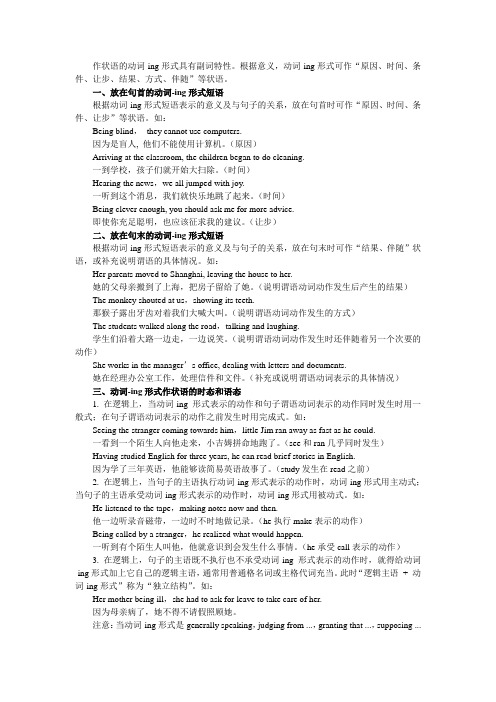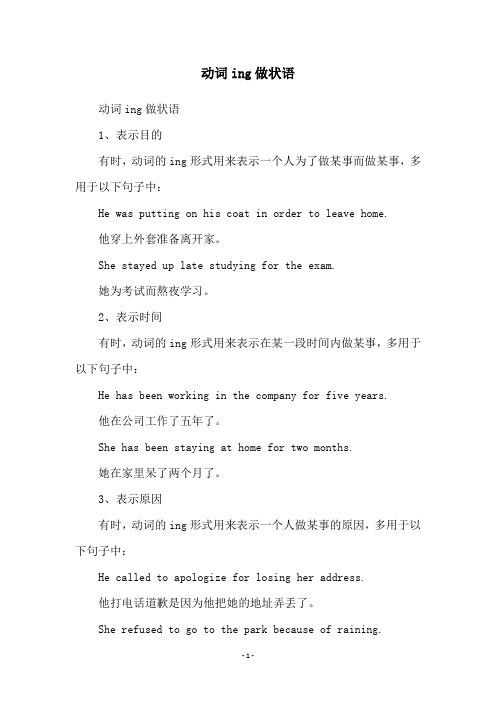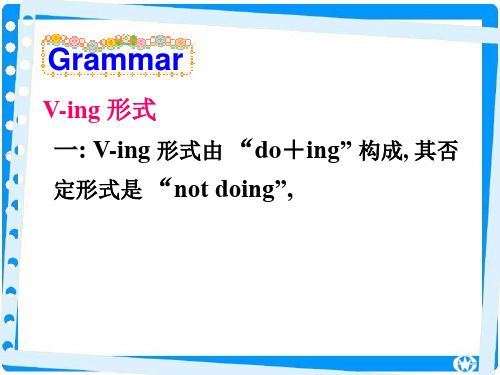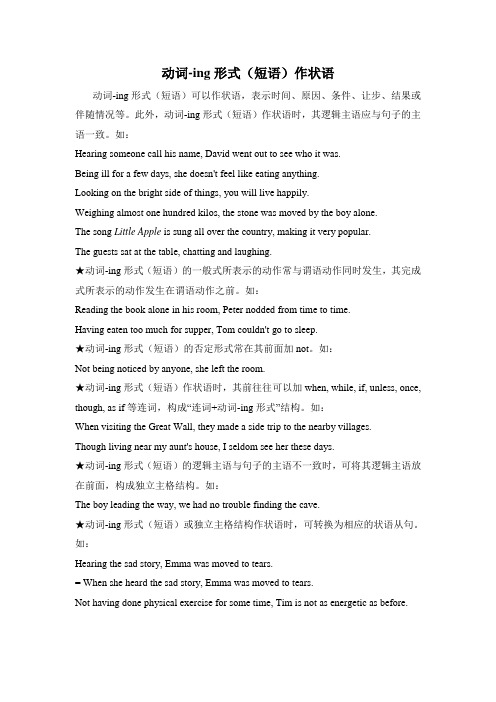动词-ing形式作状语归纳
动词-ing形式作状语

作状语的动词-ing形式具有副词特性。
根据意义,动词-ing形式可作“原因、时间、条件、让步、结果、方式、伴随”等状语。
一、放在句首的动词-ing形式短语根据动词-ing形式短语表示的意义及与句子的关系,放在句首时可作“原因、时间、条件、让步”等状语。
如:Being blind,they cannot use computers.因为是盲人, 他们不能使用计算机。
(原因)Arriving at the classroom, the children began to do cleaning.一到学校,孩子们就开始大扫除。
(时间)Hearing the news,we all jumped with joy.一听到这个消息,我们就快乐地跳了起来。
(时间)Being clever enough, you should ask me for more advice.即使你充足聪明,也应该征求我的建议。
(让步)二、放在句末的动词-ing形式短语根据动词-ing形式短语表示的意义及与句子的关系,放在句末时可作“结果、伴随”状语,或补充说明谓语的具体情况。
如:Her parents moved to Shanghai, leaving the house to her.她的父母亲搬到了上海,把房子留给了她。
(说明谓语动词动作发生后产生的结果)The monkey shouted at us,showing its teeth.那猴子露出牙齿对着我们大喊大叫。
(说明谓语动词动作发生的方式)The students walked along the road,talking and laughing.学生们沿着大路一边走,一边说笑。
(说明谓语动词动作发生时还伴随着另一个次要的动作)She works in the manager’s office, dealing with letters and documents.她在经理办公室工作,处理信件和文件。
19.动词-ing形式作状语

动词-ing形式作状语吴国斌动词-ing形式作状语时,可以表示时间、原因、结果、条件、方式或伴随动作,相当于相应的状语从句。
1.作时间状语(有时可以在动词-ing形式前加一个表时间的连词,如when,while等)相当于时间状语从句Hearing the news, they immediately set off for Shanghai.=When they heard the news, they immediately set off for Shanghai.听到这个消息,他们立即动身去上海。
Having turned off the TV set, he began to go over his lessons.=After turning off the TV set, he began to go over his lessons.关掉电视机以后,他便开始复习功课。
2.作原因状语,相当于原因状语从句Being too young, he couldn’t join the army.=As he was too young, he couldn’t join the army.因为年幼,他不能参军。
Not knowing how to get there, I had to ask the way.=As I did not know how to get there, I had to ask the way.因为不知道如何到那里,我只得问路。
3.作条件状语,相当于条件状语从句Using your head, you’ll find a good way.=If you use your head, you’ll find a g ood way.动动脑,你就会想出一个好办法。
Driving too fast, you will damage the car.=If you drive too fast, you will damage the car.如果开车太快,你会把车子弄坏的。
动词ing做状语

动词ing做状语
动词ing做状语
1、表示目的
有时,动词的ing形式用来表示一个人为了做某事而做某事,多用于以下句子中:
He was putting on his coat in order to leave home.
他穿上外套准备离开家。
She stayed up late studying for the exam.
她为考试而熬夜学习。
2、表示时间
有时,动词的ing形式用来表示在某一段时间内做某事,多用于以下句子中:
He has been working in the company for five years.
他在公司工作了五年了。
She has been staying at home for two months.
她在家里呆了两个月了。
3、表示原因
有时,动词的ing形式用来表示一个人做某事的原因,多用于以下句子中:
He called to apologize for losing her address.
他打电话道歉是因为他把她的地址弄丢了。
She refused to go to the park because of raining.
她因为下雨而拒绝去公园。
动词-ing做状语

4. The picture _____ on the wall is painted by my nephew. A. Having hung B. hanging C. hangs D. being hung
2. The student sat there, ____ what to do.
A. doesn’t knowing B. didn’t knowing
C. not know D. not knowing
3. Don’t sit there ________ nothing. Come and help me with this table.
条件
1) Four people entered the room ,looking around in a curious way. (伴随动作)
2) Being poor, he couldn’t afford a TV set.
(原因)
3) Working hard, you’ll surely succeed. 条件
1. “We can’t go out in this weather”, said Bob, ____ out of the window. A. looking B. to look C. looked D. having looked
2. The bell _______ the end of the period
3. When he sees the mountain, he always thinks of his hometown. Seeing the mountain, he always thinks _______ of his hometown.
动词-ing形式作宾补和状语

8. I left children ____(watch) television.
9. The policeman caught two boys ____(fight) in the street. 10. With the exam ____(draw)near, we all felt anxious. keys:1. lying 2. grow 3. rising 4. hoping 5. adding 6. Not having received 7. Having suffered 8. watching 9. fighting 10. drawing
(2)I often hear him sing this song.我经常 听到他唱这首歌。
注:①see sb./sth. doing变成被动语态,其 结构是sb./sth. be seen doing,doing在这里成 了主语补足语。 The missing boy were last seen playing near the river。那个失踪的男孩最后一次被看到是 在河边玩耍。
Working in the factory, she made a lot of factory. 在工厂工作期间,她交了很多朋 友。
Being ill, the boy didn’t come to school.因为 病了,那个男孩没有来学校。
Working hard, you will succeed.努力学习, 你就会成功。
Not knowing his telephone number, we couldn' t get in touch with him. 由于不知道 他的电话号码,我们没法与他联系。
动词的-ing形式-作定语和状语

现在分词作状语
现在分词作状语时,分词的逻辑主语必须是 句子的主语,但要注意它的各种形式变化:
主动形式
被动形式
一般式 V-ing
being V-ed
完成式 having V-ed having been V-ed
现在分词的否定式是在一般式和完成式的前面加not (never),即加在含有 ing 这个单词的前面。
Eg. Hearing the bell, the students began to enter the classroom.
听见铃声,学生们开始走进教室。
现在分词作状语
现在分词在句中作状语,修饰谓语动词或 整个句子,表示动作发生的原因、时间、 方式、结果、条件、伴随状况等。
1)表时间状语
1.When I was walking in the street, I came across an old friend of mine.
II. Rewrite the following sentences.
1. When he approached Ms Smith, he touched her shoulder and kissed her.
_W_h_e_n__ _a_p_p_r_o_a_c_h_i_n_g Ms Smith, he touched her shoulder and kissed her.
2. “Can’t you read?” the notice现. 在(M分ET词9作3)伴随状语
A. pointing
B. pointed
C. point
D. and pointing
3. __C__ a reply, he decided to write again.(MET92)
状语从句ing形式

状语从句ing形式状语从句是一个句子结构,在句子中起着修饰或限制主句的作用。
ing形式的状语从句使用动词的ing形式作为谓语,常用于表示时间、原因、条件、结果等方面。
下面是关于ing形式状语从句的一些相关参考内容。
1. 表示时间:- Walking along the river, I saw a beautiful sunset.(沿着河边散步时,我看到了一个美丽的日落。
)- Waiting for hours, I finally got a chance to meet the director. (等待了几个小时后,我终于有机会见到了导演。
)2. 表示原因:- Being tired, she decided to take a nap.(因为累了,她决定小睡一会儿。
)- Knowing that the exam was difficult, he studied hard.(知道考试很难,他努力学习。
)3. 表示条件:- If it keeps raining, we will have to cancel the picnic.(如果一直下雨的话,我们将不得不取消野餐计划。
)- Unless you finish your homework, you can't go out to play.(除非你完成作业,否则不能外出玩耍。
)4. 表示结果:- He lost his passport, resulting in a delayed trip.(他丢了护照,导致旅行延迟。
)- The team worked hard, achieving great success in thecompetition.(团队努力工作,取得了比赛中的巨大成功。
)5. 表示方式:- Hiking in the mountains, we enjoyed the fresh air and beautiful scenery.(在山上徒步时,我们享受到新鲜的空气和美丽的景色。
动词-ing形式(短语)作状语

动词-ing形式(短语)作状语动词-ing形式(短语)可以作状语,表示时间、原因、条件、让步、结果或伴随情况等。
此外,动词-ing形式(短语)作状语时,其逻辑主语应与句子的主语一致。
如:Hearing someone call his name, David went out to see who it was.Being ill for a few days, she doesn't feel like eating anything.Looking on the bright side of things, you will live happily.Weighing almost one hundred kilos, the stone was moved by the boy alone.The song Little Apple is sung all over the country, making it very popular.The guests sat at the table, chatting and laughing.★动词-ing形式(短语)的一般式所表示的动作常与谓语动作同时发生,其完成式所表示的动作发生在谓语动作之前。
如:Reading the book alone in his room, Peter nodded from time to time.Having eaten too much for supper, Tom couldn't go to sleep.★动词-ing形式(短语)的否定形式常在其前面加not。
如:Not being noticed by anyone, she left the room.★动词-ing形式(短语)作状语时,其前往往可以加when, while, if, unless, once, though, as if等连词,构成“连词+动词-ing形式”结构。
- 1、下载文档前请自行甄别文档内容的完整性,平台不提供额外的编辑、内容补充、找答案等附加服务。
- 2、"仅部分预览"的文档,不可在线预览部分如存在完整性等问题,可反馈申请退款(可完整预览的文档不适用该条件!)。
- 3、如文档侵犯您的权益,请联系客服反馈,我们会尽快为您处理(人工客服工作时间:9:00-18:30)。
动词-ing形式作状语归纳
1. 作时间状语
-ing短语作时间状语要置于句首。
如:
Hearing the bad news, they couldn’t help crying
.=When they heard the bad news, they couldn’t help crying.
当听到这个不幸的消息时,他们情不自禁地哭了起来。
Having received his letter, I decided to write back.
=After I had received his letter, I decided to write back.
收到他的信后,我决定给他回信。
2. 作原因状语-ing短语作原因状语置于句首。
如:
Being so angry, he couldn’t go to sleep.
=Because he was so angry, he couldn’t go to sleep. 因为太生气了,他不能入睡。
Having been to the Great Wall many times, he didn’t go last week. =Because (As) he had been to the Great Wall many times, he didn’t go last week. 因为他已经去过长城许多次,上周他就没去。
3. 作条件状语
-ing作条件状语置于句首或句末。
如:
Working hard, you will succeed.
=If you work hard, you will succeed.
如果你勤奋一点,你就会成功。
Having been given more attention, the trees could have grown better.
=If they had been given more attention, the trees could have grown better. 如果对这些树再多注意些,它们可能长得更好。
4. 作让步状语
-ing短语作让步状语,可置于句首或句末,常与even if,though 连用。
如:
Though working from morning till night, his father didn’t get enough food.
=Alt hough his father worked from morning till night, he didn’t get enough food.
虽然他父亲从早到晚拼命地干活,但是他还是挣不到足够的吃的。
5. 作伴随状语
置于句首或句末。
如:
They came into the classroom, singing and laughing. =They sang and laughed; they came into the classroom. 他们又唱又笑地走进教室。
注意:
1. -ing短语与when,while,though,until,if等连词连用时,相当于这些连词引导的一个从句。
如:
When working in the factory, he was an advanced worker.
=When he worked in the factory, he was an advanced worker.
Though willing to attend the party, he refused the invitation.
=Though he was willing to attend the party, he refused the invitation.
While staying in Beijing, he came to see me twice.
=While he was staying in Beijing, he came to see me twice.
If playing all day, you will waste your valuable time.
=If you play all day, you will waste your valuable time.
Though raining heavily, it cleared up very soon.
=Though it was raining heavily, it cleared up very soon.
2. 动词-ing形式在句中作状语时,其逻辑主语与主句的主语保持一致。
如:
He traveled on the plane like this, keeping the tortoise hidden in a blanket.
= When he traveled on the plane like this, he kept the tortoise hidden in a blanket.
小结:
V-ing有其完成式having done,表示分词动作发生于主句动作之前。
表示时间状语时常同连词when,whenever,while,once,until等连用。
分词作状语时,其逻辑主语同主句的主语一致且有逻辑主动关系,往往可转换为相应的状语从句。
V-ing形式的否定not要置于V-ing之前。
如:He sat there, not knowing what to say.
Choose the correct sentence
1. a. Hearing the news, tears ran down her face. (X)
b. Hearing the news, she cried out sadly. (√)
2. a. Entering the classroom, I found nobody in it. (√)
b. Entering the classroom, nobody was found in it. (X)
3. a. Looking out through the window, the garden was beautiful.(X)
b. Looking out through the window, we saw a beautiful garden.(√)
4. a. Reading the evening newspaper, a dog started barking.(X)
b. I was reading the evening newspaper when a dog started barking.(√)
5. a. Being fine, we will have the sports meeting next week.(X)
b. It being fine, we will have the sports meeting next week.(√)。
